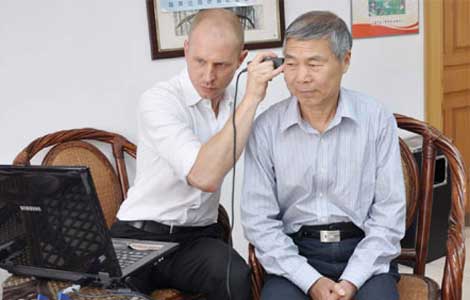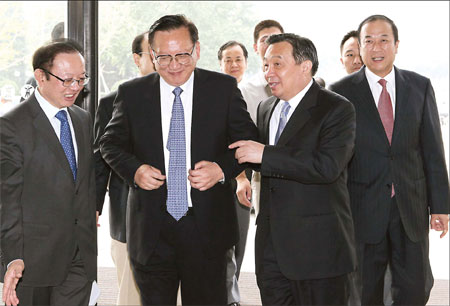Foreign and Military Affairs
Trust is vital for Sino-Japanese ties
Updated: 2011-08-22 07:28
By Wu Jiao (China Daily)
Some parts of Japanese society seek discord, diplomat tells key forum
BEIJING - China and Japan lack mutual trust in political and security affairs, a senior Chinese diplomat warned on Sunday.
Addressing a major annual forum on China-Japan relations, Tang Jiaxuan, former state councilor, attributed this to reasons of history and geopolitics as well as friction due to commercial rivalry.
"However, the underlying reason is how they perceive the development of each other," Tang said while making a keynote speech at the Beijing-Tokyo Forum that opened on Sunday.
Tang's remarks were set against a backdrop of some politicians and sections of the media in Japan drumming up anxiety over China's rapid rise, especially its position as the world's second-largest economy.
While a majority of Japanese people view China's development as a valuable opportunity not only for their country but Asia at large, some sections of Japanese society have not broken away from a "Cold War" mentality, Tang said.
They are obsessed with playing up the "China threat", and even propose to "regulate" and "contain" China's development.
"If this (tendency) continues, it will be harmful to the building of a strategic and mutually beneficial relationship between China and Japan," Tang cautioned.
Majoring in Japanese studies, Tang is a veteran diplomat, having served as foreign minister between 1998 and 2003. He was a State Councilor overseeing foreign affairs between 2003 and 2008.
Fujii Hirohisa, a leading Japanese politician, told the forum that Japan should attach great importance to its ties with China.
"There are indeed a few Japanese people who are ultra-nationalistic and we should denounce their stance," the former Japanese finance minister said through a translator.
A recent survey conducted by China Daily and Genron NPO, the sponsors of the forum, shows that there has been a sharp decline in the number of people in both countries with favorable opinions of the other. The past 12 months have been a turbulent time for relations between China and Japan.
Relations were particularly fraught after a collision between a Chinese trawler and Japanese coastguard vessels near China's Diaoyu Islands last September.
Many forum participants forecast that sensitive issues, like territorial disputes, might continue to overshadow relations.
Tang said that both countries should adhere to dialogue and negotiations to handle sensitive issues so as to minimize their negative impact.
In particular, the two countries should strengthen their maritime crisis management, Tang said, and build a mechanism to avoid incidents becoming overblown and disrupting ties.
Japanese Ambassador to China Uichiro Niwa recognized the instability in relations and called for strengthening ties with courage and determination.
He said that deepening friendship between Japan and China requires the establishment of trust, and this would be every bit as significant as economic growth.
In building trust between nations it is important to think from the perspective of the other party, the ambassador said.
Mutara Renho, Japanese Minister for Administrative Reforms, said reflection is needed on how to increase mutual understanding between the countries.
Renho proposed that government officials from each country should spend more time developing communications with their counterparts.
Founded in 2005, the Beijing-Tokyo Forum is an annual international symposium that aims to provide a non-governmental exchange platform and improve ties through public opinion polls and high-level dialogue.
The forum has become the highest-level public diplomatic communication platform between China and Japan.
The current forum sees about 300 leaders from the political, business, academic and media fields take part in a two-day discussion on ties and improving economic links.
Bilateral trade reached an historical high of $300 billion in 2010, up from the $1.1 billion when the two countries established ties in 1972.
Despite the rapid growth, the share of Japanese products among China's foreign trade is dropping.
Trade volume between China and Japan has also been overtaken by the volume between China and the Association of Southeast Asian Nations during the first half of this year.
Top government spokesman Wang Chen, minister of the State Council Information Office, told the forum that China's economic restructuring and Japan's rebuilding strategy following the devastating March earthquake provide ample opportunity for vigorous economic cooperation between the two countries.
Long Yongtu, the chief negotiator for China's entry into the World Trade Organization, said that the future of Asia lies in cooperation between China and Japan.
"It's disappointing that China and Japan have not cooperated as well as expected, like countries in Europe," Long said.
E-paper

Blue economy gets a lift
Coastal areas of Shandong, Zhejiang and Guangdong to spearhead sector development.
The light touch
Long way to go
Outdoor success
Specials

Star journalist remembered
Friends, colleagues attended a memorial service to pay tribute to veteran reporter Li Xing in US.

Hot pots
Tea-making treasures catch the fancy of connoisseurs as record prices brew up interest

Hear we go
Polish Audiologist helps thousands of Chinese hear for the first time.

